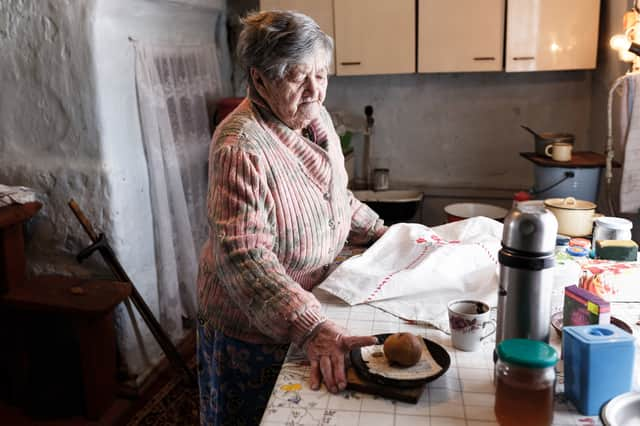Victorian diseases: NHS in England treating over 10,000 patients for malnutrition, scurvy and rickets


Hospitals in England are seeing almost 30 admissions every day relating to malnutrition, with more than 10,000 admissions reported in the last year, NationalWorld can reveal.
There have also been hundreds of hospital admissions connected to scurvy and rickets, diseases more commonly found in Victorian England and generally caused by vitamin deficiencies.
Advertisement
Hide AdAdvertisement
Hide AdFood awareness charity, Soil Association, said it was “outrageous” that people are going underfed in one of the world’s richest countries.
Malnutrition, scurvy and rickets in England
According to data sourced from NHS Digital, there were over 10,100 hospital admissions where the primary or secondary diagnosis was related to malnutrition in 2020/21 - a 274% increase on 2007/08’s figures when there were just over 2,700 admissions.
Loading....
The cause of malnutrition is not included in the figures and the NHS says it may be due to dietary issues such as if another disease is preventing a person from absorbing food normally.
The illness is most commonly affecting elderly people. Last year 19% of admissions for malnutrition were in the 70 to 79 age group. However, 2,575 under 50s were admitted including 114 under 10s and 304 10 to 19 year olds.
Loading....
Advertisement
Hide AdAdvertisement
Hide AdThe NHS has also seen a rise in the number of hospital admissions relating to scurvy.
Scurvy is caused by a severe vitamin C deficiency, often down to a lack of fresh fruit and vegetables in the diet - infamously connected to the poor health of sailors in the 18th century. It causes tiredness, severe joint pain and swollen, bleeding gums.
NHS figures reveal there were over 170 hospital admissions where the primary or secondary diagnosis was related to scurvy in 2020-21. There has been a slight drop in admissions since 2018-19 but still a 180% increase on 2007-08 when there were 61 admissions relating to scurvy.
Rickets, which is largely caused by a lack of vitamin D and calcium, causes painful and fragile bones, dental problems and skeletal deformities and is also being treated by doctors across England.
Advertisement
Hide AdAdvertisement
Hide AdLast year there were 391 hospital admissions in relation to the disease. On average, 535 admissions are recorded each year, though admissions have fallen since a peak in 2011-12.
‘Deeply concerning trends’
Rob Percival, head of food policy at the Soil Association, said the trends were “deeply concerning but not entirely surprising”.
Mr Percival said: “The recent National Food Strategy highlighted that people in Britain are eating too many ultra-processed foods, with many families struggling to afford fresh and healthy produce.
“This health crisis has been growing in plain sight. It’s outrageous that in one of the world’s wealthiest economies so many people are going hungry and underfed.”
Advertisement
Hide AdAdvertisement
Hide AdMr Percival added that the Government must implement recommendations from The National Food Strategy which includes an extension of free school meal eligibility, supporting families with food insecurity and actions to encourage a less heavily-processed diet.
He said the Government is expected to respond in January.
Identify those at risk
Kirsty Robinson, stroke and neuroscience clinical lead dietitian at NHS Tayside added: “The causes of malnutrition are multifactorial and therefore to prevent this concerning trend the solutions must be multifactorial too.
“Identifying those at risk of malnutrition early, understanding how to manage dietary needs and overcoming potential barriers to adequate food intake, is essential, given the serious health and financial consequences linked to malnutrition.”
Reducing health inequalities across England
A government spokesperson said: “We are committed to levelling up and reducing health inequalities across the country. This is why we have launched the new Office for Health Improvement and Disparities to ensure everyone can live healthy, happy lives.
Advertisement
Hide AdAdvertisement
Hide Ad“Malnutrition is a serious condition and we are working with the NHS and public health organisations to tackle its root causes.”
A message from the editor:
Thank you for reading. NationalWorld is a new national news brand, produced by a team of journalists, editors, video producers and designers who live and work across the UK. Find out more about who’s who in the team, and our editorial values. We want to start a community among our readers, so please follow us on Facebook, Twitter and Instagram, and keep the conversation going. You can also sign up to our newsletters and get a curated selection of our best reads to your inbox every day.
Comment Guidelines
National World encourages reader discussion on our stories. User feedback, insights and back-and-forth exchanges add a rich layer of context to reporting. Please review our Community Guidelines before commenting.
